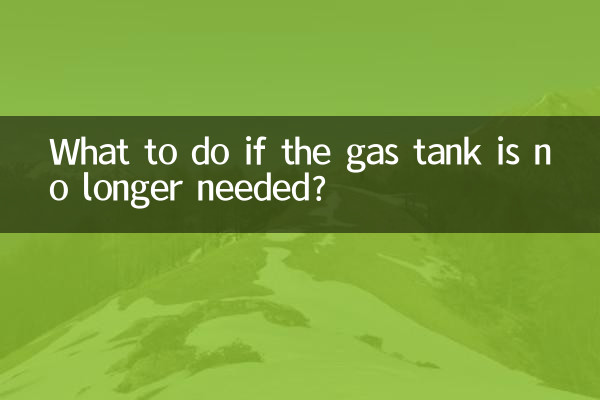What to do if the gas tank is no longer needed?
With the upgrading of gas equipment in households and catering industries, the disposal of discarded gas cylinders has gradually become the focus of public attention. Recently, discussions on the disposal of gas cylinders have become increasingly popular across the Internet. Especially in the context of increasing awareness of environmental protection and safety, how to properly dispose of discarded gas cylinders has become a hot topic. This article will combine the hot content of the past 10 days to provide you with structured data and suggestions.
1. Frequently Asked Questions about Disposal of Waste Gas Cans

Based on recent online discussions, here are the main issues and considerations regarding the disposal of discarded gas cans:
| Question type | Specific content | frequency of occurrence |
|---|---|---|
| safety hazard | Disposal may cause explosion or fire | high frequency |
| environmental issues | Gas tank residual gas pollutes the environment | IF |
| recycling channels | I don’t know how to find a regular recycling point | high frequency |
| legal liability | Illegal disposal may result in fines | low frequency |
2. Correct way to dispose of waste gas cans
According to the latest recommendations from local gas companies and environmental protection departments, the following are the steps to correctly dispose of discarded gas cylinders:
| step | Operating Instructions | Things to note |
|---|---|---|
| 1. Confirm discard | Check whether the gas tank is completely used | Make sure the valve is closed |
| 2. Contact the supplier | Call the original purchase or inflatable company phone number | Keep proof of purchase |
| 3. Professional recycling | Waiting for professionals to come to your home for recycling | Never disassemble it yourself |
| 4. Registration and filing | Fill out the relevant forms when recycling | Keep proof of recycling |
3. Comparison of recycling policies in various places
Recently, many places have introduced new policies on the recycling of discarded gas cylinders. The following are the latest regulations in major cities:
| City | recycling policy | Subsidy standard |
|---|---|---|
| Beijing | Free door-to-door recycling | cashless subsidy |
| Shanghai | Recycling at designated recycling points | Subsidy 20 yuan per can |
| Guangzhou | Trade-in offer | Deduct the cost of new cans |
| Shenzhen | Appointment recycling system | Environmental protection points reward |
4. Hot topics discussed by netizens
In the past 10 days of online discussions, the following topics have attracted widespread attention:
1.Shared gas tank: Some netizens asked whether the sharing economy model is suitable for gas tank management, sparking heated discussion.
2.Smart recycling bin: Some areas are piloting smart recycling bins, and users can make reservations to put in waste gas cans through the APP.
3.Second-hand market circulation: How to regulate the trading of second-hand gas cylinders has become a focus of discussion, with most netizens supporting strengthening supervision.
4.Rural area treatment: The problem of imperfect recycling networks in rural areas has attracted attention, calling for the establishment of more convenient recycling channels.
5. Expert advice
Environmental protection and safety experts have made the following recommendations for the disposal of discarded gas cans:
1.Don't take matters into your own hands: Even empty tanks may contain dangerous gases and should be handled by professionals.
2.Process in time: Gas tanks that have been idle for a long time may leak and should be contacted for recycling as soon as possible.
3.Choose formal channels: Avoid selling waste gas cans to informal recyclers and prevent them from flowing into illegal channels.
4.Raise security awareness: Strengthen safety education on the use and disposal of gas cylinders, especially remind children to stay away from discarded gas cylinders.
Through the above structured data and content, I hope it can help you understand how to properly dispose of waste gas cans, which not only ensures safety but also protects the environment. If you have more questions, it is recommended to consult your local gas company or environmental protection department for the latest information.

check the details

check the details